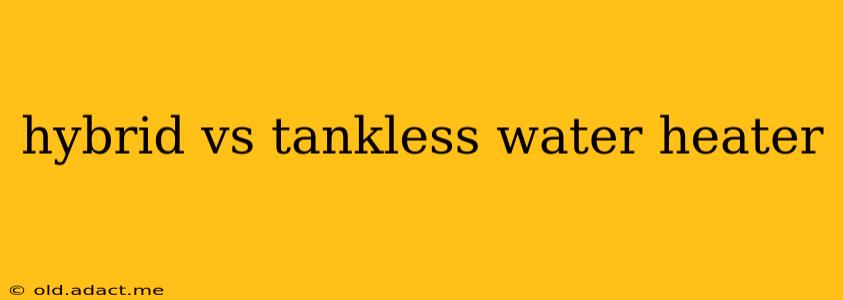Choosing the right water heater can significantly impact your comfort, energy bills, and home's value. Two popular options vying for homeowners' attention are hybrid (heat pump) water heaters and tankless (on-demand) water heaters. Both offer energy efficiency improvements over traditional tank water heaters, but they operate very differently and cater to different needs. This comprehensive guide will help you understand the key distinctions and decide which system best suits your home and lifestyle.
What is a Hybrid Water Heater (Heat Pump Water Heater)?
A hybrid water heater, also known as a heat pump water heater, uses electricity far more efficiently than traditional electric tank heaters. Instead of directly heating the water with resistive heating elements, a hybrid system extracts heat from the surrounding air and transfers it to the water tank. This process consumes significantly less energy, resulting in substantial savings on your electricity bills. Think of it like a refrigerator working in reverse.
Advantages of Hybrid Water Heaters:
- High Energy Efficiency: Significantly lower operating costs compared to traditional electric tank water heaters. They often boast Energy Factor (EF) ratings exceeding 3.0, far surpassing standard electric models.
- Environmentally Friendly: Reduced energy consumption translates to a smaller carbon footprint.
- Quiet Operation: Generally quieter than tankless water heaters.
- Consistent Hot Water Supply: Provides a reliable supply of hot water, even during peak demand periods, unlike tankless systems that can struggle under high-flow situations.
Disadvantages of Hybrid Water Heaters:
- Higher Initial Cost: Hybrid water heaters typically have a higher upfront purchase price than standard electric tank heaters and sometimes even tankless models.
- Space Requirements: They are generally larger than traditional tank water heaters and require adequate ventilation.
- Performance in Cold Climates: Efficiency can decrease in extremely cold environments as the heat pump struggles to extract heat from the cold air.
- Not ideal for high-demand situations: While they offer better hot water supply than standard electric tank heaters, very high-demand situations could still result in a slight delay before sufficient hot water is available.
What is a Tankless Water Heater (On-Demand Water Heater)?
A tankless water heater, also known as an on-demand water heater, heats water only when you need it. Unlike traditional tank water heaters that constantly heat and reheat water, a tankless system heats water directly as it passes through a heating element. This eliminates standby heat loss, leading to significant energy savings.
Advantages of Tankless Water Heaters:
- Endless Hot Water: Potentially provides an endless supply of hot water, eliminating the risk of running out of hot water during peak usage times.
- Energy Efficient: Significantly more energy-efficient than traditional tank water heaters, though usually less efficient than hybrid heat pump heaters.
- Space-Saving: Compact design requires minimal space, ideal for smaller homes or apartments.
- Long Lifespan: With proper maintenance, tankless water heaters can last for 20 years or more.
Disadvantages of Tankless Water Heaters:
- Higher Initial Cost: The upfront cost is typically higher than standard tank water heaters.
- Higher Installation Costs: Installation can be more complex and costly due to the need for specific venting requirements.
- Potential for Lower Flow Rate: Can struggle to provide sufficient hot water for multiple simultaneous uses (e.g., shower and washing machine). Higher-flow models are available but come with a higher price tag.
- Maintenance: Requires regular maintenance, including cleaning and descaling, to ensure optimal performance.
Hybrid vs. Tankless: Which is Better for My Home?
The best choice between a hybrid and a tankless water heater depends on several factors:
- Your Budget: Consider the initial cost, installation costs, and long-term operating costs. Hybrids usually offer the best long-term cost savings, but the initial investment is significant.
- Your Hot Water Usage: If you have a large household with high hot water demands, a tankless system might struggle unless you choose a high-flow model. Hybrids handle higher demand better than standard electric tank heaters.
- Your Climate: Hybrid heat pump systems perform best in moderate climates. Their efficiency decreases significantly in extremely cold climates.
- Available Space: Hybrids require more space than tankless units.
What are the different types of tankless water heaters?
Tankless water heaters come in two main types: gas and electric. Gas tankless water heaters typically offer higher flow rates and faster heating than electric tankless models, but require a gas line connection. Electric tankless water heaters are more straightforward to install if you already have ample electrical capacity. The best type for your home will depend on your existing infrastructure and energy preferences.
What is the lifespan of a hybrid water heater?
Hybrid water heaters generally have a lifespan of 10-15 years, although this can vary depending on usage and maintenance.
How much does a hybrid water heater cost to install?
The cost of installing a hybrid water heater varies depending on several factors, including the size of the unit, the complexity of the installation, and your location. It's advisable to obtain multiple quotes from qualified installers.
How much does a tankless water heater cost to install?
The cost of installing a tankless water heater varies depending on factors such as the type of water heater (gas or electric), the complexity of the installation, and your location. It’s best to get quotes from multiple licensed plumbers.
By carefully considering these factors and weighing the pros and cons of each system, you can make an informed decision about the best water heater for your specific needs and budget. Remember to consult with a qualified plumber or HVAC technician to determine the ideal solution for your home.
